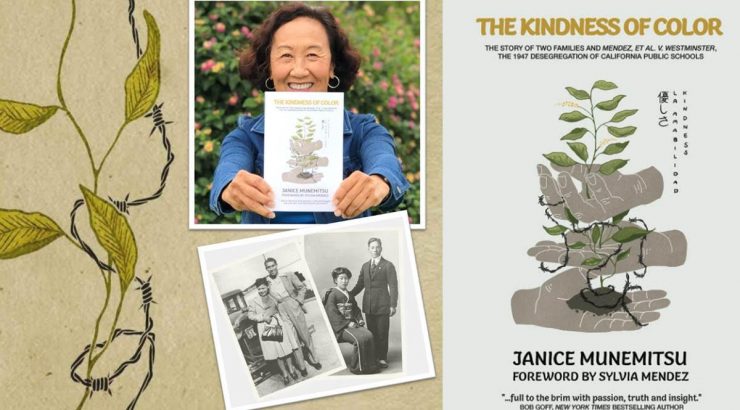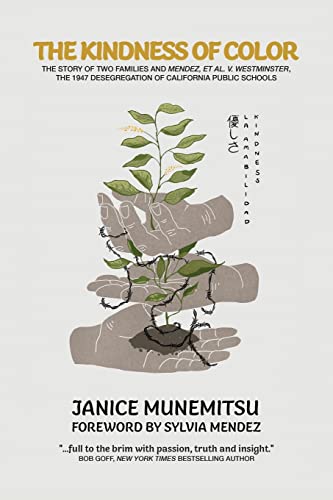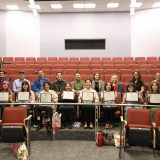
The Kindness of Color: The Story of Two Families Engaging the World: Leading the Conversation on Ethnic Studies
November 2, 2022
 Wilkinson College of Arts, Humanities, and Social Sciences recently welcomed author Janice Munemitsu, whose family was imprisoned in a Japanese American internment camp, and Sylvia Mendez, a plaintiff in the Mendez et al. v. Westminster school desegregation case, as part of Wilkinson’s Engaging the World initiative, Leading the Conversation on Ethnic Studies. The discussion explored the obstacles faced by the Mendez and Munemitsu families, and the exchange of kindnesses that helped them endure racism and hardships exacerbated by World War II. In her book, The Kindness of Color: The Story of Two Families and Mendez et al v. Westminster, the 1947 Desegregation of California Public Schools, Munemitsu examines this story of allyship, in hopes that her book “inspires us to cultivate increasing kindness toward one another.”
Wilkinson College of Arts, Humanities, and Social Sciences recently welcomed author Janice Munemitsu, whose family was imprisoned in a Japanese American internment camp, and Sylvia Mendez, a plaintiff in the Mendez et al. v. Westminster school desegregation case, as part of Wilkinson’s Engaging the World initiative, Leading the Conversation on Ethnic Studies. The discussion explored the obstacles faced by the Mendez and Munemitsu families, and the exchange of kindnesses that helped them endure racism and hardships exacerbated by World War II. In her book, The Kindness of Color: The Story of Two Families and Mendez et al v. Westminster, the 1947 Desegregation of California Public Schools, Munemitsu examines this story of allyship, in hopes that her book “inspires us to cultivate increasing kindness toward one another.”
Facing widespread racism and xenophobia in the tumultuous landscape of WWII, the Munemitsus endured forced relocation to a Japanese American ‘internment’ camp in Poston, Arizona. The Munemitsus were able to avoid selling their land for pennies when Munemitsu’s grandfather leased his farmland in Westminster, California to Mr. and Mrs. Gonzalo and Felicitas Mendez, Sylvia’s parents, an exchange facilitated by Mr. Frank Monroe, a white banker of the First Western Bank of Garden Grove.
This deal, struck from mutual need, was a win-win that entwined both families’ stories. This story, said Munemitsu, is rooted in kindness: “neighbors to neighbors, friends to friends, doing what they could to help out.”
Wilkinson College was privileged to welcome Munemitsu and Mendez to share their story as part of this year’s Engaging the World initiative, which centers the conversation on diverse histories, cultures, and perspectives of people of color, with the goal of foregrounding the voices and experiences within communities of color. Mendez, a recipient of the Presidential Medal of Freedom, has devoted her life to civil rights activism and speaking with students about her experiences. She expressed that this event would be her last campus visit. We are honored that she gave her time to speak with us.
“I had already learned about the Mendez et al v Westminster case in my Latinx studies classes, but I had not learned about Janice’s family and their role. This history—POC history in the United States—is usually not brought to light in school curriculum, and when it is, it’s surface level. There is so much more to our history, so it was inspiring to hear how Japanese, Mexican, Jewish, and Anglo people showed each other kindness during an era where hate, racism, and xenophobia was prominent. This event reinforced my belief that, with unity and solidarity, we can foster change,” said Wendy Medina-Herrera (‘23, Latinx Studies).
While the Munemitsus endured life behind barbed-wire fences for three years, Mendez and her brother, now growing up on the Munemitsus’ farm, were denied entry into the Westminster 17th Street School. They instead were forced to attend Hoover School, the designated school for children of Hispanic descent, where they faced white teachers’ prejudices and the presumption of inferior linguistic and academic ability. Advocating for an equal education for their children, Mr. and Mrs. Mendez and four other families became plaintiffs in a Federal Class Action Lawsuit. Aided by Attorney David Marcus, who was familiar with the Hispanic community in Westminster and hired with profits from the asparagus crop grown on the Munemetsus’s farm, they won the case. The decision, would later play a critical role in the historic 1954 Brown v. Board Supreme Court decision ruling legally segregated schools unconstitutional.
“The Kindness of Color has become one of the books at the top of my reading list. Seeing Janice Munemitsu and Sylvia Mendez speak was an exhilarating experience,” said Alesia Orta, (’24, Playwriting and Screenwriting, Communication and Media double major ). “I felt honored to be able to listen to both of their experiences that helped lead to the Mendez et al. v Westminster case. I found this experience very inspiring because I learned how meaningful friendships are in every situation.”
Munemitsu’s lecture revealed the hidden histories of the Munemitsu and Mendez families, and connected these family stories to the larger narratives of Japanese American incarceration and the landmark Mendez et al. v. Westminster case – pivotal events that occurred right here in Orange County.

